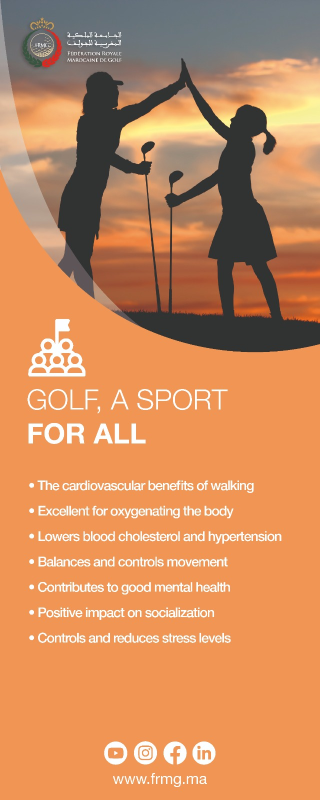Why golf ?
Golf for Health

Because the cardiovascular and joint benefits of walking have long been proven. Golfers generally walk outdoors for 4 to 5.5 hours, i.e. 6 to 7 km, which is excellent for oxygenating the body and burning calories to keep their weight under control.
Golf is a sport in which the risk of injury is low, provided you warm up properly before playing. The low risk of injury means that, unlike other sports that are harder on the body, golf can be enjoyed by as many people as possible for a large part of their lives.
The benefits of this sport lie in the "structure" of your body. It helps maintain muscle strength. Your back, shoulders, hips, wrists, glutes, thighs, calves and abdominals are all involved in the swing. It's a complex movement that uses many of your body's muscles, requiring skill, strength and coordination. A recipe for lifelong fitness.
The benefits of this sport lie in balance and control of movement. Golf is as good as or even better than tai chi for working on balance. In fact, balance is essential as we age, as it helps us to avoid nasty falls. Balance is also a very useful asset in virtually all sports.
The benefits of golf lie in its contribution to psychological health. Indeed, during a round of golf, the brain is constantly engaged, which promotes good neurological health. You're thinking about the right club, the right distance, the right trajectory, analyzing the wind and the greens. All these actions stimulate the neurons in your brain, which is a significant benefit to your health. Studies have shown that neuronal stimulation is a major factor in slowing down neurological aging. What's more, the concentration you need to play golf throughout the game is another benefit for your psychological health.
Golf also has a positive impact on the socialization of individuals. During their round, golfers have plenty of opportunity to chat with each other. This period of time allows individuals to fulfill the need for socialization essential to good psychological health. Golfers can play with friends or strangers, which is also good for socialization. The practice of golf therefore reduces the rate of depression, dementia and anxiety. This validates the positive impact of golf on mental health, which is essential to an individual's overall health.
Closely linked to mental health, golf also has a positive influence on stress levels. Although golf can generate a few moments of stress, it is a good way to learn to control it. What's more, golf is played in a calm, soothing, green setting. Golf is also played in a context of pleasure and relaxation, for people who are of course good-natured on the course. It's a great way to cut yourself off from everyday life, and especially from the worries of the office, for those who turn off their cell phones at the start. In this sense, golf allows you to experience a moment of plenitude, focused on: living in the moment, essential to success, or at least playing to your full potential.
The final benefit of golf is linked to the health of your heart, no less!
In fact, playing a round of golf on foot, of course, at a frequency of around 2-3 times a week, provides the physical activity needed to promote good heart health. As an added bonus, golf lowers blood cholesterol levels and improves carbohydrate metabolism. This reduces the risk of diabetes and hypertension. Diabetes affects around 1 in 10 people worldwide (WHO). Golf is therefore an important ally in the fight against this disease.





















